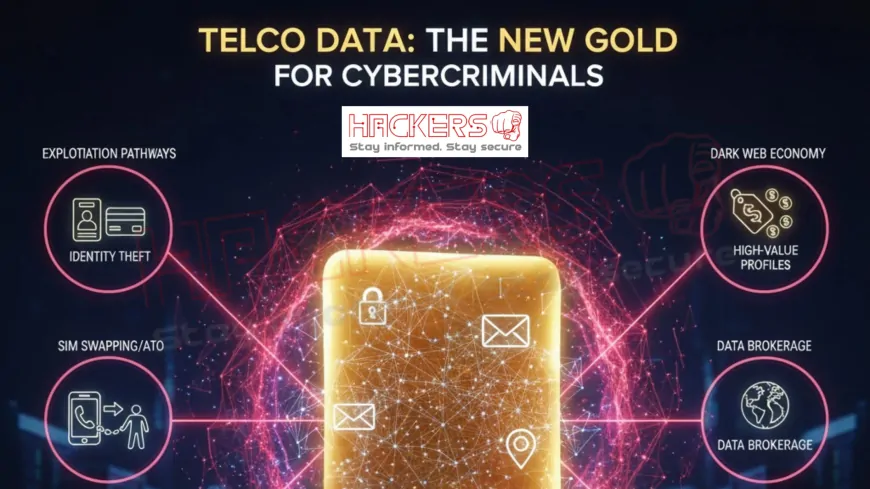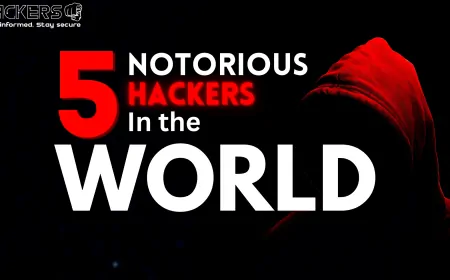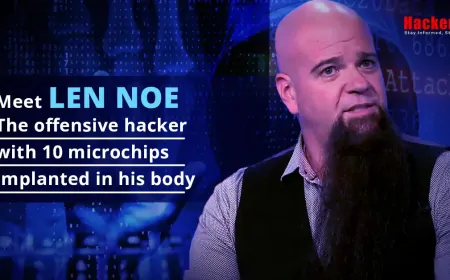Why Is Telco Data the New Gold for Cybercriminals?
Imagine waking up to find that someone knows everything about you: your name, your address, your family members, your bank details, your location at 3 a.m. last Tuesday, and even the last text you sent. Now imagine that person is not a detective or a friend. They are a criminal sitting halfway across the world, ready to sell your life for a few hundred dollars. This is not science fiction. It is happening right now, and the source of this treasure? Your telecom provider. Telecom companies, or telcos, hold the most intimate digital footprint of your life. Every call, every message, every tower ping, every app login. They know you better than your closest friend. And that is exactly why cybercriminals are obsessed with telco data. It is not just valuable. It is liquid gold in the underground economy. In this blog post, we will explore why telco data has become the hottest commodity on the dark web, how criminals use it, real-world examples of breaches, and what you can do to protect yourself. No technical degree required, just a clear look at a growing digital danger.

Table of Contents
- What Exactly Is Telco Data?
- Why Is Telco Data So Valuable?
- How Do Cybercriminals Steal Telco Data?
- What Do Criminals Do With Stolen Telco Data?
- Real-World Telco Data Breaches
- The Dark Web Market Value of Telco Data
- How Telcos Are Fighting Back
- What You Can Do to Protect Your Data
- The Future of Telco Data Risks
- Conclusion
What Exactly Is Telco Data?
Telco data is everything your mobile carrier collects to keep your phone working. It is split into two main types:
- Subscriber Data: Your name, address, Aadhaar or national ID, date of birth, payment details, and SIM registration info.
- Traffic Data: Call logs, SMS content (sometimes), location history via cell towers, data usage, IP addresses, and device IDs (IMEI/IMSI).
In India, eKYC laws require telcos to store Aadhaar-linked data. In the U.S., carriers keep call detail records (CDRs). In Europe, GDPR limits retention, but traffic data is still logged for billing and network management. This data is stored in massive databases, often shared with law enforcement, third-party vendors, and roaming partners. Every connection point is a potential leak.
Why Is Telco Data So Valuable?
Telco data is the ultimate identity package. It is accurate, up-to-date, and verified by government ID. Unlike hacked email accounts or social media profiles, telco records are trusted. Here is why criminals love it:
- Complete Identity: One record gives name, address, DOB, and phone, perfect for fraud.
- Financial Access: Phone numbers are linked to bank accounts, UPI, and OTPs (one-time passwords).
- SIM Swap Attacks: With your details, criminals convince carriers to port your number and take over your accounts.
- Targeted Phishing: Knowing your location and call patterns lets scammers craft believable messages.
- Blackmail and Extortion: Call logs reveal affairs, debts, or sensitive contacts.
- Corporate Espionage: Employee phone data exposes business deals and travel.
In short, telco data is the master key to your digital and physical life.
How Do Cybercriminals Steal Telco Data?
Telcos are not easy targets, but they are not invincible. Common attack methods include:
- Insider Threats: Bribed or disgruntled employees sell access to databases.
- API Exploits: Weakly secured customer portals or billing APIs allow bulk data pulls.
- Phishing Staff: Fake emails trick IT teams into giving credentials.
- Third-Party Breaches: Vendors handling billing or analytics get hacked, exposing telco-shared data.
- SS7 Attacks: Exploiting old signaling protocols to intercept SMS or track location (used by state actors).
- Malware on Devices: Infected apps or rogue base stations steal data before it reaches the carrier.
Once inside, hackers use scripts to scrape millions of records in hours.
What Do Criminals Do With Stolen Telco Data?
The uses are limited only by imagination, but here are the top ones:
- SIM Swapping: Port your number, receive bank OTPs, drain accounts.
- Account Takeover: Reset passwords on Gmail, WhatsApp, or crypto wallets.
- Spam and Vishing: Call centers use real data for “bank refund” or “Aadhaar update” scams.
- Identity Theft: Open loans, credit cards, or file fake tax returns.
- Dark Web Sales: Bundles sold in packs of 10,000 for $500 to $5,000.
- State-Sponsored Surveillance: Track activists, journalists, or rivals.
Real-World Telco Data Breaches
History is full of examples that prove the danger is real.
- Airtel India (2021): 2.5 million users' Aadhaar, addresses, and phone numbers leaked by Red Rabbit Team.
- T-Mobile USA (2021): 54 million customers' names, SSNs, and IMEI numbers exposed via API flaw.
- AT&T (2024): Call logs of 110 million users stolen from a third-party cloud provider.
- Optus Australia (2022): 10 million records with passport and driver’s license numbers breached.
- Vodafone (Global, 2023): Internal employee tool leaked customer data in 12 countries.
These are not isolated incidents. They are symptoms of a systemic problem.
The Dark Web Market Value of Telco Data
On hacker forums, telco data has a clear price tag. Here is a snapshot from 2024-2025 dark web listings:
| Data Type | Details Included | Price per 1,000 Records | Region |
|---|---|---|---|
| Basic Subscriber | Name, Phone, Address | $50 to $150 | India, SEA |
| Premium with ID | + Aadhaar/Passport, DOB | $300 to $800 | India, EU |
| Call Detail Records | 30-day logs, contacts | $1,000 to $3,2 | USA, UK |
| Live Location Access | Real-time tracking | $5,000 per target | Global |
| Corporate Bundle | CEO + team data | $10,000+ | Any |
Compare this to a stolen credit card ($5 to $20) or email list ($1 per 1,000), and you see why telco data is premium.
How Telcos Are Fighting Back
Telcos are investing heavily in defense, but the battle is tough.
- Zero-Trust Architecture: No one is trusted by default, even inside the network.
- AI Anomaly Detection: Flags unusual data access, like 1 million queries at 2 a.m.
- Encryption: Data at rest and in transit is scrambled.
- Employee Monitoring: Track who accesses sensitive databases.
- Third-Party Audits: Regular security checks on vendors.
- Bug Bounty Programs: Pay ethical hackers to find flaws.
In India, TRAI and CERT-In now mandate breach reporting within 6 hours. Fines can reach crores.
What You Can Do to Protect Your Data
You are not powerless. Simple habits go a long way:
- Use strong, unique PINs for carrier accounts
- Enable SIM lock and port-out PINs
- Turn off online account access if not needed
- Avoid clicking links in SMS from unknown numbers
- Freeze your credit if you suspect a leak
- Use virtual numbers for online signups
- Report spam to your carrier and 1930 (India)
The Future of Telco Data Risks
The problem will get worse before it gets better.
- 5G and IoT: Billions of connected devices mean more data points.
- eSIMs: Easier to swap, easier to hijack.
- AI-Powered Attacks: Deepfakes and voice cloning for vishing.
- Quantum Computing: Could break current encryption in the future.
- Global Roaming: Data shared across borders with varying laws.
On the bright side, privacy laws like GDPR, CCPA, and India’s DPDP Act are forcing change.
Conclusion
Telco data is the new gold because it is the most trusted, complete, and actionable identity dataset in existence. From SIM swaps to corporate espionage, the damage potential is immense. Breaches at Airtel, T-Mobile, and Optus show no telco is immune. On the dark web, your phone number is worth more than your credit card. But hope is not lost. Telcos are hardening defenses with AI, encryption, and zero trust. Regulators are waking up. And you, the user, hold power in your habits. The future of digital privacy depends on all of us: carriers securing systems, governments enforcing laws, and individuals staying vigilant. Your data is valuable. Treat it like gold, and never hand it over without a fight.
What is telco data?
It is the personal and usage information your mobile carrier collects, like your name, ID, call logs, and location.
Why is telco data more valuable than email data?
It is verified by government ID, linked to banking, and includes real-time location and call patterns.
What is a SIM swap attack?
Criminals use your data to convince your carrier to port your number to their SIM, hijacking your phone.
How much is my phone data worth on the dark web?
Basic info: $0.05 to $0.15 per record. With Aadhaar or SSN: $0.30 to $0.80.
Can telcos see my WhatsApp messages?
No. They see metadata (who, when, how much data), not encrypted content.
Is 5G making telco data less secure?
Not inherently, but more devices and faster networks expand the attack surface.
How do insiders steal telco data?
They use legitimate access to export databases or sell login credentials.
Can I opt out of telco data collection?
No, it is required for service. But you can limit online account features.
What is SS7 and why is it risky?
An old telecom protocol that allows location tracking and SMS interception when exploited.
Do police need a warrant for my call logs?
In most countries, yes. But emergencies or national security can bypass this.
Are budget carriers less secure?
Not necessarily, but smaller firms may have weaker cybersecurity budgets.
Can I use a VPN to protect telco data?
It hides your internet activity from your ISP, but not subscriber or location data.
What is a port-out PIN?
A secret code you set with your carrier to prevent unauthorized number porting.
Why do telcos share data with third parties?
For billing, analytics, roaming, and law enforcement requests.
Has any telco been fined for data breaches?
Yes. T-Mobile paid $60 million in the U.S. Optus faced a class-action lawsuit.
Can deleted SMS be recovered from telco records?
No. Carriers do not store message content long-term in most cases.
Is eSIM safer than physical SIM?
It is harder to steal physically, but digital porting risks remain.
How do I know if my data was leaked?
Check sites like Have I Been Pwned or watch for unusual account activity.
Should I avoid linking Aadhaar to my SIM?
It is mandatory in India, but ensure eKYC is done in-person at authorized stores.
Will privacy laws stop telco data sales?
They limit legal sharing, but not criminal breaches. Strong enforcement is key.
What's Your Reaction?










































































